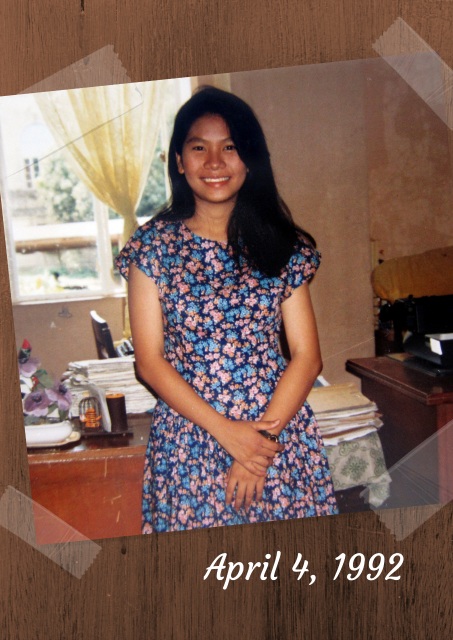Filtered By: Opinion
Opinion
First Person: Marriage. Null. Void
By PAMMY GODOY
This was me three months and five days after I celebrated my 18th birthday. 

This was me almost one month after I gave birth to my first son.
This was me in a city hall waiting to get married to the father of my son.
The city Mayor looked at our marriage application form and saw our respective ages—18 and 22. He said that perhaps we should seriously reconsider our decision to get married given that we are quite young. We did not heed his advice.
My inner voice was screaming at me to stand up and walk out of the room and not push through with the marriage. I did not heed its advice either.
We went through with the civil wedding ceremony.
I went through with it knowing full well that the main reason I wanted to get married was for my son not to be labeled as a bastard or a child born out of wedlock. I also thought that people would be less judgmental of me if I return to school as a "newly married young woman with a child" rather than as an unwed mother. But as I said in my book “Sex, Virginity, and Relationships: What I Wish I Knew in College,” marriage is not the answer to an unplanned pregnancy.
When you get married for the wrong reasons, it came as no surprise that our marriage did not last. We were together for about two years then we separated.
In 1998, he filed a petition in court to declare our marriage null and void due to psychological incapacity (Declaration of Absolute Nullity of Marriage under Article 36 of the Family Code of the Philippines).1 Two years later, the case was for the decision of the Judge but I filed an urgent motion to re-open the case to fight for custody rights of our child. It was acceptable for me to be declared as psychologically incapacitated to fulfil my obligations as a married person but certainly NOT to be also declared as psychologically incapacitated to fulfil my role as a mother to my son. In October 2001, he filed a motion to dismiss the case, essentially saying that he does not wish to pursue the case.
In May 2002, after putting together a substantial amount of money to pay a lawyer’s acceptance fee, I filed a case to seek nullity of our marriage in another regional trial court. The case eventually became another custody battle over our son. As he was already working abroad at that time, his father intervened on his behalf to fight for custody of our son. In 2004, my lawyer informed me that he cannot continue handling my case. Due to financial constraints, I could not immediately hire another lawyer so the case was eventually "dismissed without prejudice" in 2005 by the Judge.
Seven years later, in 2012, I filed another case in the city where I currently reside. I spent Saturday evenings over several months in the clinic of the psychiatrist that I engaged. I was answering tests and writing by hand my life story since childhood. I remember having nightmares during that period. My psychiatrist told me that it is a normal reaction for someone who was trying to unearth and recall difficult life moments like coping with the death of my father when I was 6 1/2 years old and the challenges of being a mother and wife at a very young age.
In January 2014, I had to make a tough decision to let go of the law firm that was representing me since I could no longer afford to pay their expensive fees despite the discount I was given. I sought the help of a friend to help me find a lawyer who specializes in family law and is willing to take on my case. Thank God I found another one right away.
I was lucky my case was raffled off to a Judge who is known to be very sensitive and understanding about individuals who want to end his/her marriage. When I was placed in the witness stand to give my testimony, it was less traumatic than the first nullity case because the Judge ordered the people who have nothing to do with my case to leave the court room. I did not have to relay the saga of the failure of my marriage in front of so many strangers. Several months later, when it was the turn of my psychiatrist to give her expert testimony, the Judge once again ordered the court to be vacated given the highly delicate and confidential situations that my psychiatrist will discuss in her testimony.
In November 2014, the Judge rendered her decision to declare our marriage as “void ab initio2 on the ground of psychological incapacity on the part of both parties under Article 36 of the Family Code with all the legal consequences provided by law.” The decision became final and executory on 1 January 2015 as no motion for reconsideration, new trial, or appeal was filed by the public prosecutor or the Office of the Solicitor General.
April 4, 2015.
Today, more than 20 years after I got married, I can finally close this chapter in my life. In the coming weeks, I will be going back to the National Statistics Office to get my marriage certificate annotated to reflect that it was declared null and void. I will then go through the tedious process of changing my surname back to Godoy in all my documents, starting with my national passport.
 This was the compilation of all the documents pertaining to this third and last case. I have two more thick stack of court files from the previous cases. They don’t quite capture though all the tears, heartaches, and emotional anguish that I went through—in being untimely married, in the fierce custody battle over our child, and in attempting to legally end a marriage.
This was the compilation of all the documents pertaining to this third and last case. I have two more thick stack of court files from the previous cases. They don’t quite capture though all the tears, heartaches, and emotional anguish that I went through—in being untimely married, in the fierce custody battle over our child, and in attempting to legally end a marriage. I paid a high price—mentally, emotionally, and financially—for my decision to get married and for all my bad decisions that led to that fateful day.
I hope that you don’t get to experience what I went through.
So if you would like to get married someday, I hope you get married for all the right reasons. As Gary Chapman, a marriage counsellor for 35 years emphasized, being in-love is not an adequate foundation for marriage. I hope you invest more time in preparing for your marriage than planning your wedding day.
In the meantime, I urge you to live your life to the fullest. Pursue your passions. Travel. Use your talents to make a positive difference in your community. Find your purpose.
1 Article 36 of the Family Code of the Philippines provides that “a marriage contracted by any party who, at the time of the celebration, was psychologically incapacitated to comply with the essential marital obligations of marriage, shall likewise be void even if such incapacity becomes manifest only after its solemnization.”
2 Void ab initio, which means "to be treated as invalid from the outset."
Pammy Godoy is an advocate for women's empowerment and gender equality. She is also the author of "Sex, Virginity, and Relationships: What I Wish I Knew in College." This article previously appeared on her blog. It is reposted here with the author's permission.
The views expressed in this article are those of the author and do not necessarily reflect the position of this website.
The views expressed in this article are those of the author and do not necessarily reflect the position of this website.
More Videos
Most Popular



